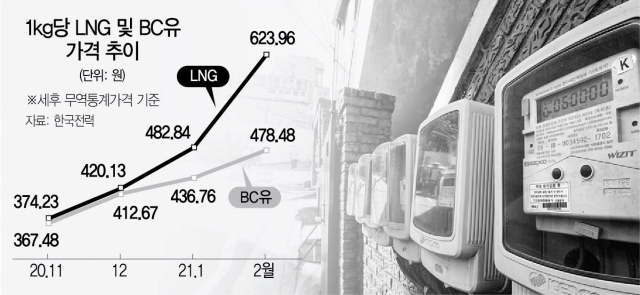[2분기 전기요금 동결]
Soaring prices of LNG and bunker oil, etc.
The impression factor is clear, but the decision to’freeze’
Purpose of introducing fuel cost indexing system Colorless
Re-enactment of the utility bill bombing
 viewer
viewer
“If you would do this, why did you introduce fuel cost indexing?”
On the 22nd, a research fellow at the Korea Energy Economics Institute strongly criticized KEPCO for setting the fuel cost adjustment unit price for the second quarter of this year (April to June) at -3 won per 1 ㎾h, the same as the previous quarter. The reason for the introduction of the fuel cost indexing system is to eliminate the government’s arbitrary electricity rate setting practice, but it does not make sense to freeze electricity rates despite fuel cost hikes. In fact, according to KEPCO’s operating guidelines for fuel cost adjustment, electricity bill is calculated by subtracting the average fuel cost for the previous three months (actual fuel cost) from the average fuel cost for one year (standard fuel cost).
According to this, electricity bills for the second quarter of this year should be higher compared to the previous quarter. Liquefied natural gas (LNG), which accounts for about 37% of the domestic power generation in terms of effective capacity, averaged 508 won per kilogram from December last year to February this year, compared to the average price of three months from September to November last year (350 won). 24 ago) jumped. The price of bunkerseed oil also increased from 373 won per 1 kilogram to 442 won 64 jeon during the same period, and bituminous coal price increased from 108 won 65 jeon to 113 won 61 jeon, respectively.
The fuel cost from December of last year to February of this year, multiplied by these numbers by the conversion factor, was 288 won per 1 kg and 7 days before, up 28% from the previous quarter, 225 won and 5 days ago. Accordingly, the fuel cost adjustment unit price should be increased by 80 points by 2 KRW compared to the previous quarter (-3 KRW per 1 kWh) to -20 points per 1 kWh.
On the other hand, the Ministry of Trade, Industry and Energy has prevented an increase in electricity rates for reasons such as a temporary surge in LNG prices due to an abnormal cold wave and the stabilization of people’s lives, which are suffering from the prolonged Corona 19. In particular, the Ministry of Industry and KEPCO side regulated the adjustment unit price per quarter within ±3 won per 1 kWh, even though the fuel adjustment unit price in the previous quarter was -10 won 50 per 1 kWh, so it was -7 won 50 per 1 kWh. As the unadjusted amount has occurred, there is no problem with the delay in the adjusted unit price. KEPCO’s side, conscious of the criticism, revealed only the relevant calculation formula when releasing the’fuel cost adjustment unit price calculation details’ in the previous quarter, but this time it revealed in detail the reason for the freezing of the fuel cost adjustment unit price.
Earlier in the market, the analysis that the government, ahead of the Seoul-Busan mayoral election by-election, will not take out a card to increase electricity rates was dominant. Kim Yong-beom, the 1st Vice Minister of the Ministry of Strategy and Finance, also gave power to such observations by stating, “We will minimize the impact of rising international oil prices on consumer prices by stably managing public charges in the second quarter by stably managing public charges in the second quarter” at the Vice Minister’s Meeting on Price Relations on the 19th. The Ministry of Industry consults with the Ministry of Equipment when determining the electricity rate.
On the other hand, shareholders of KEPCO are dissatisfied with the system of determining electricity rates based on political judgment. On this day, the stock price of KEPCO recorded 23,000 won per share, down 4.76% from the previous day.
Considering the current rising oil prices, some point out that it will not be easy for the government to keep down on electricity bills. Dubai oil price, which accounts for about 70% of domestic oil use, has risen steadily from $53.12 per barrel in the first week of January this year to $57.34 in the first week of February and $63.31 in the first week of March. The rise in oil prices leads to a rise in the prices of major energy sources including natural gas. If the rise in energy prices is not reflected in electricity bills, the purpose of introducing a fuel cost indexing system will inevitably fade. There are also criticisms that the government is reenacting the’spreading the utility bill bomb’, which suppresses utility bills ahead of large events such as elections.
Chung Dong-wook, professor of energy engineering at Chung-Ang University, said, “KEPCO’s performance was good last year, so it has the potential to cut electricity rates. In order to alleviate the situation, it is necessary to continuously devise measures to improve performance.”
/ Sejong = Reporter Yang Chulmin [email protected], Sejong = Reporter Kim Woobo [email protected]
< 저작권자 ⓒ 서울경제, 무단 전재 및 재배포 금지 >
